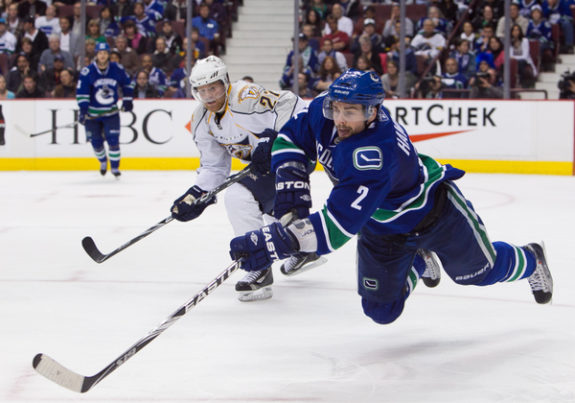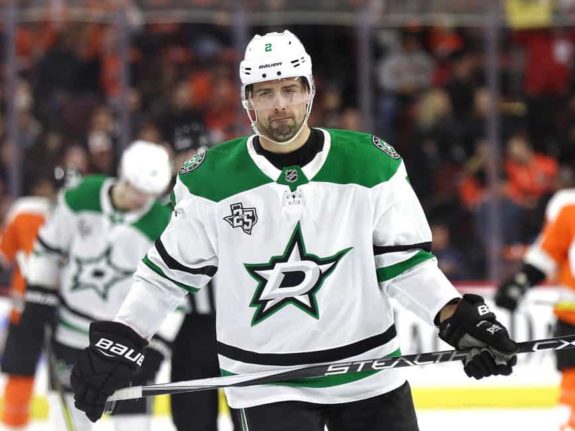Dan Hamhuis is calling it a career after the Nashville Predators’ qualifying round exit. He will end his career where it began, in “Music City.”
Hamhuis is one of those players that, similar to Ottawa Senators’ Chris Phillips, was a high draft pick (in Phillips’ case, first overall) and had a great career, but perhaps doesn’t get the credit he deserves. This is likely due to their high draft slot, which when you’re taking a defenseman with a top-15 pick, the expectations are high. I’m here to give “Hammer” that credit.
Prince George Cougars
The Western Hockey League (WHL) is where Hamhuis got his start and where he established himself as a legitimate hockey prospect with the Prince George Cougars. In his final two seasons he had 59 points and 60 points respectively and have over 100 penalty minutes, which at the turn of the millennium, was pretty coveted for a defenseman. A real “get you a man who can do both” type scenario. Before embarking on his pro career he left junior with a trophy case that held the Bill Hunter Memorial trophy (top WHL D), the Four Broncos trophy (top WHL player) and the award for top defenseman in the Canadian Hockey League.
Hamhuis’ junior resume was good enough to have him selected by the Nashville Predators in the first round of the 2001 NHL Entry Draft at 12th overall.
The Predators Years (The First Time)
It’s tough to step right into the NHL, that’s no secret. It’s why what Quinn Hughes, Cale Makar, Rasmus Dahlin and Miro Heiskanen have done is so impressive, before they could buy a beer in the United States. Hamhuis didn’t play as an 18-year-old rookie, but his rookie season was impressive nonetheless. He stepped in as a 21-year-old rookie and played 80 games with 7 goals and 19 assists for 26 points.
Related: Predators: Revisiting the Mikael Granlund/Kevin Fiala Trade
His work on the blue line as well as the scoring of fellow 21-year-old Scott Hartnell and veteran Scott Walker gave the Predators their first-ever playoff berth. They went on to lose in the Quarterfinal to the Detroit Red Wings, but coach Barry Trotz knew he had a solid horse on the back end in Hamhuis.

His sophomore season came over a year later due to NHL lockout, but Hamhuis didn’t miss a beat. In fact, it was his best as a Predator and a career best in terms of point totals. He was relied upon for 22:34 of ice time on average and scored 38 points. The Predators lost again in the Stanley Cup Quarterfinal, but Hamhuis was part of the developing Barry Trotz identity that he and the Predators became known for — world-class defense. Hamhuis, Timonen, Zidlicky and then-young guns Ryan Suter and Shea Weber added to the impressive stable and style that defined them.
“He’ll knock you on your can,”
Nashville head coach Barry Trotz, 2002
Hamhuis spent the next four seasons with the Predators, but the surplus of talented defense in Nashville ultimately made him expendable and led to his exit.
He signed with the Vancouver Canucks in the 2010 offseason, taking a hometown discount at $27 million over six years.
The Canucks Years
The years Hamhuis spent with the Canucks not only gave him his best shot at the Stanley Cup (losing to the Boston Bruins in Game 7 in 2011), but was also the best season of his career and one of the best seasons from the team’s blue line since.

Hamuis finished 16th twice in Norris Trophy voting and finished 10th once. That was in 2011-12 season, which was not only when the Canucks made it to the Stanley Cup Final, but Hamhuis played a major role. He scored 37 points (one short of his career high), was plus-29 and was 1 hit shy of the 100/100 hit/block club. What makes this season stand out for him is that he finished with a 19.6 Goals Above Replacement (GAR), which put him 70th in all skaters since that season and 15th among defensemen in that time. That means that only 14 times has an NHL defensemen had a better GAR season than Hamhuis since the 2011-12 season. Not a bad peak for your NHL career.
He reluctantly left the Canucks in free agency for the Dallas Stars. (from ‘Dallas ends up with Hamhuis. Not for nothing, but close enough,’ Vancouver Sun, 07/01/2016) There was speculation about his desire to stay in his hometown, but he ultimately signed with the Stars on July 1, 2016 on a two-year deal worth $3.75 per season.
The Stars Years and a Return to Nashville
Hamhuis was entering his age-34 season when he first laced up with the Stars, but still managed to log just under 20 minutes a game each season and put up 16 and 24 points seasons. He was relied upon to be a veteran presence on a back end that featured young blueliners such as John Klingberg, Esa Lindell and Jamie Oleksiak. After his first season in Dallas he saw head coach Lindy Ruff fired, a coach that healthy scratched him for the first time in 14 years. (from ‘What Dan Hamhuis did following his first healthy scratch in 14 years: ‘It wasn’t the easiest day’,’ Dallas News, 11/01/2016) The next season playing under Ken Hitchcock, he watched his former team, the Predators, reach the Stanley Cup Final.

Hamhuis left Dallas that offseason and signed another two-year deal worth $2.5 million total. (from ‘Preds bring back another first-rounder,’ Nashville Post, 07/25/2018) He returned to Nashville in hopes of finally winning the Stanley Cup, a feat that always alluded him in his career. He was once again among a world-class top defensive core — an identity he once helped build — but this time he would be the veteran.
Related: Filip Forsberg Trade Revisited
He now had more of a depth role, for the first time seeing his minutes average below 19 per game. This is understandable considering he was entering his age-36 season playing with the likes of Roman Josi, Ryan Ellis, Mattias Ekholm and P.K. Subban (who was traded at the end of the season to the New Jersey Devils). His first season back resulted in a first-round exit to his former team, the Stars.
The Predators and Hamhuis failed to complete their goal of returning to the Stanley Cup Final again in 2019-20. At the end of his two-year deal and an early exit during the qualifying round of the NHL Playoffs he finally decided to call it a career… in Nashville, where it all started.
Hammer’s legacy
That 2011-12 season was the peak of Hamhuis’ career — we will forget the fact that it wasn’t in Nashville — and was his best shot at Lord Stanley, as he rejoined the Predators the season after the franchise’s first Stanley Cup Final berth. However, he won a gold medal in Sochi during the 2014 Olympics and played 1,148 games and averaged 21:21 time on ice per game in his career.
He ends his career seventh on the Predators’ all-time list for games played at 600 and should be remembered as a great member of the Nashville community, a player who always found a way to stand out among elite D cores, and among the best defensemen drafted and developed by the Predators franchise, which says a lot.